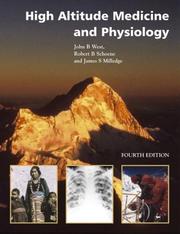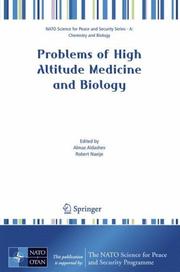| Listing 1 - 2 of 2 |
Sort by
|

ISBN: 9780340913444 0340913444 Year: 2007 Publisher: London : Hodder Arnold,
Abstract | Keywords | Export | Availability | Bookmark
 Loading...
Loading...Choose an application
- Reference Manager
- EndNote
- RefWorks (Direct export to RefWorks)
Adaptation, Physiological. --- Altitude. --- Acclimatization. --- Altitude Sickness. --- Hypoxia. --- Mountain sickness. --- Altitude, Influence of. --- Adaptation (Physiology) --- Mal des montagnes --- Influence de l'altitude --- Adaptation (Physiologie)

ISBN: 1281115541 9786611115548 1402063008 1402062990 1402062982 Year: 2007 Publisher: Dordrecht : Springer Verlag,
Abstract | Keywords | Export | Availability | Bookmark
 Loading...
Loading...Choose an application
- Reference Manager
- EndNote
- RefWorks (Direct export to RefWorks)
The major characteristic pathological findings of pulmonary vascular remodelling are increased wall thickening of pulmonary vessels and mus- larization of small arteries. In laboratory animals, decreased ambient oxygen concentrations cause similar pathological findings, including pulmonary smooth muscle hypertrophy and proliferation [22,23]. It has been suggested that proliferation of pulmonary arterial smooth muscle cells (PASMC) is a key component of pulmonary vascular remodelling, and several in vitro studies have also addressed that exposure to hypoxia can stimulate prolife- tion of PASMC [13,4,1]. The proliferation of the PASMC begins when the cells enter into the cell cycle. The most important molecular event necessary for the progress of the cell cycle is phosphorylation of retinoblastoma protein by cyclin-dependent kinase (CDK)-cyclin complexes. The CDK activity can be inhibited by CDK inhibitors and the expression of CDK inhibitor is a major regulator of the transition between each phase of the cell cycle [7]. Previous studies have noted that CDK inhibitor p27 plays an important role in the inhibition of the CDK activity and proliferation in vascular smooth muscle cells [2,3]. The G1 phase in severe hypoxia is suggested to involve the CKI p27, because the expression of p27 increased in several cell-lines when they were exposed to extreme hypoxia [20,5]. Previous reports indicate that hypoxia decreases the p27 expression in the murine lung [23,24] and we found that PGI2 suppresses hypox- induced proliferation of PASMC and maintains p27 in PASMC [20].
Altitude, Influence of. --- Mountain sickness. --- Altitude, Influence of --- Acclimatization --- Atmospheric pressure --- Medical climatology --- Physiological effect --- Physiology --- Sports medicine. --- Pneumology. --- Cardiology. --- Physiological, Cellular and Medical Topics. --- Sports Medicine. --- Pneumology/Respiratory System. --- Mathematics. --- Heart --- Internal medicine --- Athletic medicine --- Athletics --- Medicine and sports --- Physical education and training --- Sports --- Medicine --- Sports sciences --- Animal physiology --- Animals --- Biology --- Anatomy --- Diseases --- Medical aspects --- Biomathematics. --- Respiratory organs—Diseases. --- Mathematics
| Listing 1 - 2 of 2 |
Sort by
|

 Search
Search Feedback
Feedback About UniCat
About UniCat  Help
Help News
News